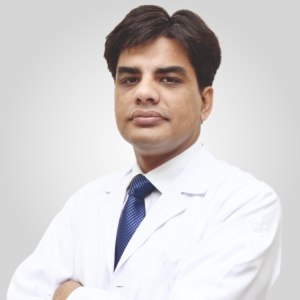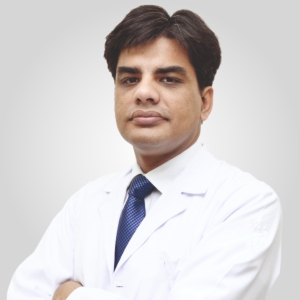
Dr Neeraj Chaudhary, Director – GI-HPB Oncology, GI Surgery, Minimally Invasive Surgery (Robotics and Laparoscopic) and Liver Transplant, Yatharth Superspeciality Hospital, Greater Noida and Noida 110
Gastrointestinal cancers impact the GI tract and the digestive system including Esophagus, stomach, small and large intestines, liver, gallbladder, pancreas, etc. These cancers can originate from any organ in the abdomen as ulcers or masses and can metastasize to the other parts in no time if go unnoticed. While timely diagnosis increases the chances of better treatment and prolonged survival of the patient, delayed treatment impacts the outcome of the treatment and may also have adverse consequences on the quality of life. The rise in cases also show the low level of awareness due to which early detection isn’t possible.
From the past few years, the incidences of gastrointestinal and HPB cancer cases have been rising at an exponential rate in our country, particularly due to the lack of awareness associated with the subject. Early diagnosis and prompt treatment have significant importance in preventing mortality from such diseases. On the other hand, the rapidly growing advancements in the field of science and technology, newer treatment options like minimally invasive GI surgeries, Laparoscopic surgeries and Robotic surgeries have completely changed the face of cancer treatment at a greater scale. Minimal invasive GI surgeries have become a great addition to the field as they provide an innovative approach in the treatment of cancer while ensuring minimal blood loss, quicker recovery and shorter hospital stays.
Recent data shows that developing countries are facing a sharp increase in cancer incidence. But at the same time, there have been numerous advancements in cancer care. However, the majority of our population is not able to avail of the benefits of these developments due to a sheer lack of knowledge and myths associated with the subject.
One of the biggest reasons for the rise in such cases is lack of awareness among the general public about the early signs and symptoms which leads to delayed diagnosis and treatment causing poor prognosis. Poor lifestyle choices including unhealthy dietary intake with dependence on junk food, along with binge alcoholism and erratic sleep patterns are some of the major known causes of the exponential rise in such cases. Early and prompt treatment can help prevent the rise in GI diseases.
As of the Globocan India 2020 report, gastrointestinal (GI) cancers continue to pose a significant health burden in the country. The data reveals varying incidences and mortality rates across different types of GI cancers. Colorectal cancer, a common GI malignancy, showed notable incidence, with a substantial number of new cases reported. Similarly, stomach cancer demonstrated a significant presence in the population. The mortality rates associated with GI cancers underline the severity of these conditions, emphasizing the need for effective prevention, early detection, and treatment strategies. The Globocan India 2020 findings underscore the importance of ongoing efforts to address the challenges posed by GI cancers and to implement comprehensive public health measures to reduce the incidence and mortality rates associated with these diseases.
With the advancement of technologies, minimal access to cancer surgeries has also become commonplace. Experts can adequately resect difficult tumors including colon cancers, stomach cancer, including liver metastases which suggest a late-stage disease, with minimal incisions or even laparoscopically, in certain cases.
Some of the key diagnostic tools used for detecting GI cancers:
Endoscopy:
Colonoscopy: This procedure involves inserting a flexible tube with a camera (colonoscope) into the rectum to examine the entire colon. It is effective in detecting colorectal cancers and polyps.
Esophagogastroduodenoscopy (EGD or Upper Endoscopy): This involves the insertion of a scope through the mouth to examine the esophagus, stomach, and the beginning of the small intestine. It is commonly used for detecting esophageal, stomach, and duodenal cancers.
Endoscopic Ultrasound (EUS):
EUS combines endoscopy with ultrasound imaging, providing detailed images of the digestive tract and surrounding structures. EUS is particularly useful for assessing the extent of GI cancers, staging tumors, and guiding biopsies.
Computed Tomography (CT) Scan:
CT scans are used to obtain detailed cross-sectional images of the abdomen and pelvis. They are valuable for detecting tumors, evaluating lymph nodes, and determining the extent of cancer spread.
Magnetic Resonance Imaging (MRI):
MRI can provide detailed images of soft tissues, making it useful for evaluating the liver, pancreas, and other abdominal organs. It is often employed for staging and planning treatment.
Biopsy and Pathological Examination:
Tissue samples obtained during endoscopy, surgery, or other procedures are examined under a microscope to confirm the presence of cancer and determine its type and grade.
Tumor Markers:
Blood tests measuring specific biomarkers associated with certain GI cancers may aid in diagnosis and monitoring treatment response. Examples include CEA (carcinoembryonic antigen) for colorectal cancer.
PET-CT Scan:
Positron emission tomography combined with computed tomography can be used to detect abnormal metabolic activity, helping to identify areas of possible cancer spread.
Minimally invasive surgeries have numerous advantages for patients in comparison to traditional surgeries including minimal scars, faster recovery, reduced pain, shorter duration of hospital stays, and lesser post-surgery complications. The preference for Robotic Surgery has increased after the pandemic since it reduces hospital stay and post-surgical complications.
People still need to be aware that with recent advancements in oncology, cancer is completely treatable. And early diagnosis can, not significantly increase the chances of survival, but also provide a better quality of life.



